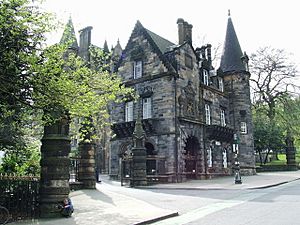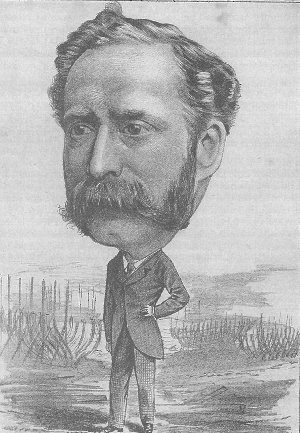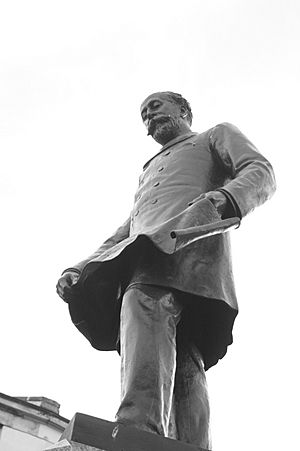Sir William Pearce, 1st Baronet facts for kids

Sir William Pearce, 1st Baronet (born January 8, 1833 – died December 18, 1888) was a very important British shipbuilder. He managed the Fairfield Shipbuilding and Engineering Company in Govan, Scotland. Under his leadership, this company became the best shipbuilding company in the world! Later, he also became a politician for the Conservative Party.
Contents
Sir William's Amazing Career
William Pearce was born in a place called Brompton, near Chatham in Kent. His father was Joseph George Pearce.
Becoming a Shipbuilder
William trained to be a shipwright, which is someone who builds and repairs ships. He also learned about naval architecture at the Chatham Dockyard. This is where he learned how to design ships.
He helped build HMS Achilles, which was the first ironclad warship built in Chatham. Ironclad warships were new types of ships with strong iron armor. After this, in 1863, he moved to Scotland. There, he started working for Lloyd's Register on the River Clyde, checking ships.
Leading the Way in Shipbuilding
William's career grew very quickly. Just one year after moving to Clydeside, he became the general manager of Robert Napier and Sons. Here, he designed new, very fast ships that could cross the Atlantic Ocean for a company called Compagnie Générale Transatlantique.
In 1869, he became a partner at a company called John Elder & Co. After the other partners left, he became the only owner of the company in 1878. In 1886, he spent more time on his political work in London. Because of this, he changed his business into a limited company called the Fairfield Shipbuilding and Engineering Company. William Pearce remained the chairman, which means he was still in charge.
Fairfield became a world leader in designing ships and building their engines. They were famous for creating the triple expansion engine. This was a special type of engine that made ships go faster and use less fuel. The shipyard and its offices in Govan were huge, covering more than 70 acres (about 28 hectares). They employed up to 5,000 workers!
Fairfield built ships for many big shipping companies. These included the Pacific Steam Navigation Company and the New Zealand Shipping Company. William Pearce also owned a lot of shares in some of these companies. He was also the chairman of the Guion Steamship Company and the Scottish Oriental Steamship Company.
William Pearce's Political Life
Because he was a very important businessman in Govan, William Pearce also became a public official. He was a Commissioner, which is like a local council member, for the Burgh of Govan.
He tried to become a Member of Parliament (MP) for the Glasgow area in the 1880 election, but he didn't win that time. However, after some changes to the voting areas, he was elected in the 1885 election. He became the MP for the new Govan area. He won by a small number of votes, only 155 more than his opponent from the Liberal Party.
William Pearce was elected again in the 1886 election. This time, he won by a slightly larger number of votes, 362. On July 21, 1887, he was given the special title of Baronet. This meant he became "Sir William Pearce, 1st Baronet, of Cardell in the County of Renfrew."
His Lasting Impact
Sir William Pearce passed away suddenly at 55 years old. This happened at his home in Piccadilly, London, on December 18, 1888. He is buried in Gillingham, Kent. There is also a special memorial for him in Craigton Cemetery in Glasgow. The famous architects Honeyman and Keppie designed this monument.
He was survived by his wife, Dinah Elizabeth Socoter, who was from Gravesend. They had one child, William George Pearce, who inherited his father's baronetcy title.
Sir William Pearce left a lot of money when he died, about £1,069,669. His statue still stands at Govan Cross. Near it is the Pearce Institute, a building with a public hall, a library, and other rooms. His wife gave this building to the people of Govan to honor him.
 | William Lucy |
 | Charles Hayes |
 | Cleveland Robinson |



